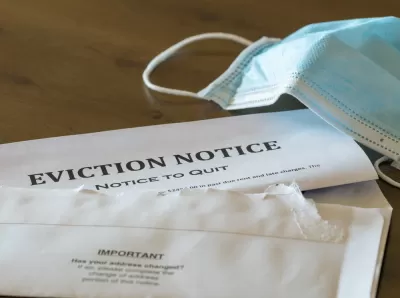Emily Benfer talks about what needs to change in our housing and eviction systems—not just now, but once the pandemic is past, the connections between health and housing, and how she came to be a go-to voice on the eviction crisis.

Emily Benfer is a professor of law at Wake Forest University, chair of the American Bar Association’s COVID-19 Task Force Committee on Eviction, and co-creator of The Eviction Lab COVID-19 Housing Policy Scorecard. Over the past year she’s been called upon as an expert on the current state of evictions by outlets from NPR to C-SPAN to Fox. Shelterforce spoke with Benfer in mid-February about how she came to be a go-to voice on the eviction crisis, the connections between health and housing, and what needs to change in our housing and eviction systems—not just now, but once the pandemic is past.
The following transcript has been edited for length and clarity. Watch the full interview here.
Miriam Axel-Lute: How did you get into housing law?
Emily Benfer: Before I went to law school, I was working at a Legal Aid office in Connecticut. From that early point, it was so clear that housing was paramount to livelihood, that it was one of the pillars of resiliency.
I was collecting evidence around housing code violations, and I would go into families’ homes and take pictures of mold and infestations and other problems. Everyone was sick, and everyone needed legal assistance to remedy those things that were causing their illness.
That really inspired a legal career. I started working with families who are homeless in Washington, D.C., and saw firsthand the extent of harm that eviction and housing displacement causes for families, and how homelessness itself sets you on that downward trajectory of poor health and barriers to opportunity.
All of those experiences really led to this moment of understanding the injustice in the eviction system itself, the imbalance of power, and the extreme harm that families and individuals face for as little as being a few dollars behind or a few days late on the rent.
Brandon Duong: How do you see public health, law, and poverty relating to one another?
Poverty is a social determinant of poor health. And the conditions of poverty often lead to poor health outcomes for families and individuals who are facing economic instability or distress. Public health laws are able to regulate many of the conditions of poverty, like substandard housing conditions, the environments that people live in. Housing law is also implicated here in terms of the historic effects of redlining and how we’re investing in communities. All of these fields are connected, and in the same way that social issues are—they are a Gordian knot. You cannot isolate them and expect to unravel it; you have to look at the whole.
One of the areas that I focus on pretty heavily is health justice. This is really an attempt to try and understand the social roots of health inequity and address subordination of historically marginalized groups, especially people of color [and] people in poverty. A health justice framework looks at discrimination—both on a systemic and interpersonal level—but also [at] the laws and policies that are in place because of that discrimination and that subordination.
Law is truly a determinant of health. You literally can’t cross the street without walking through a law or some sort of regulation that’s governing and dictating your behavior. And in the same way, law determines the type, the quality, [and] the access to housing.
Duong: One of the problems with the recent CDC eviction moratorium is the inconsistency in how judges are interpreting it. Could you talk about that issue?
The CDC moratorium is a really good example of [when] public health and housing intertwine. It is a pandemic mitigation strategy designed to keep people in their homes so that we can control the spread of COVID-19. That is only effective ...
FULL STORY: Fixing the Harms of Our Eviction System: An Interview with Emily Benfer

Planetizen Federal Action Tracker
A weekly monitor of how Trump’s orders and actions are impacting planners and planning in America.

Chicago’s Ghost Rails
Just beneath the surface of the modern city lie the remnants of its expansive early 20th-century streetcar system.

San Antonio and Austin are Fusing Into one Massive Megaregion
The region spanning the two central Texas cities is growing fast, posing challenges for local infrastructure and water supplies.

Since Zion's Shuttles Went Electric “The Smog is Gone”
Visitors to Zion National Park can enjoy the canyon via the nation’s first fully electric park shuttle system.

Trump Distributing DOT Safety Funds at 1/10 Rate of Biden
Funds for Safe Streets and other transportation safety and equity programs are being held up by administrative reviews and conflicts with the Trump administration’s priorities.

German Cities Subsidize Taxis for Women Amid Wave of Violence
Free or low-cost taxi rides can help women navigate cities more safely, but critics say the programs don't address the root causes of violence against women.
Urban Design for Planners 1: Software Tools
This six-course series explores essential urban design concepts using open source software and equips planners with the tools they need to participate fully in the urban design process.
Planning for Universal Design
Learn the tools for implementing Universal Design in planning regulations.
planning NEXT
Appalachian Highlands Housing Partners
Mpact (founded as Rail~Volution)
City of Camden Redevelopment Agency
City of Astoria
City of Portland
City of Laramie




























